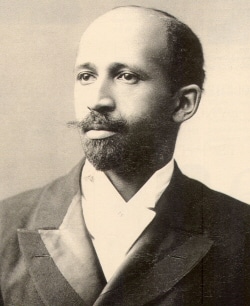Biography
- Full name: William Edward Burghardt Du Bois

- Born February 23, 1868
- Parents were of a mixed African, French, and Dutch parentage
- Lived in Massachusetts
- Racially profiled in high school
- 1885-1888: went to Frisk University in Nashville
- 1895: PHD from Harvard (First African- American)
- 1909: Help found the National Association for the Advancement of Coloured People (NAACP)
- Wrote 20 Books including: The Philadelphia Negro: A Social Study (1899), The Souls of Black Folk (1903)
Theories of Social Change
Theory of Value: What knowledge and skills are worthwhile learning? What are the goals of education? Education and work are the levers to uplift a people. Work alone will not do it unless inspired by the right ideals and guided by intelligence. Education must not simply teach work – it must teach Life. We must train native races in modern civilization. Urged fellow blacks to retain their cultural identity and to foster black art and literature.
Theory of Knowledge: What is knowledge? How is it different from belief? What is a mistake? A lie? Adhered to the philosophy of pragmatism and participated in the most advanced developments of modern thought. “I hold it Truth: that every argument rests on an unproved postulate which contains implicit the whole conclusion.
Theory of Human Nature: What is a human being? How does it differ from other species? What are the limits of human potential? Black men must be treated as human, sentient, responsible beings, not as cattle. Proud of his people, not because their color endowed them with vague greatness but because their concrete achievements in struggle had advanced humanity. He saw and loved progressive humanity in all its hues, black, white, yellow, red and brown. Always human beings will live and progress to greater, broader, fuller life.
Theory of Learning: What is learning? How are skills and knowledge acquired? Thought of education in the broadest possible social context. Education and ability are not today matters of chance, but mainly of individual desert and effort. Urged black universities to be centered on the particular economic, social, and political problems that confront Afro-Americans. Attempted to construct “A Rational System of Negro Education” by reconciling the two widely diverting tendencies of the day, training for making a living and training for living abroad life.
Theory of Transmission: Who is to teach? By what methods? What will the curriculum be? The small percentage of black intellectuals whom he referred to as “The Talented Tenth” should provide the strong leadership that the nation’s blacks so desperately needed. The Negro race, like all races is going to be saved by its exceptional men. Wanted predominantly Black Colleges to redirect the contemporary curricula toward greater relevancy to society’s problems.
Theory of Society: What is society? What institutions are involved in the educational process? Black Americans are of a divided nature. Being black as well as American, they seemed to have two identities. Blacks had an identity that separated them from other Americans in society. The Negro is a sort of Seventh son, born with a veil, and gifted with second sight in this American world. The “veil” was the fabric of racism that kept blacks concealed from whites, and it also kept blacks from seeing themselves clearly. Black Americans should more strongly develop community institutions. (NAACP)
Theory of Opportunity: Who is to be educated? Who is to be schooled? The black man has to embrace the accepted goals of hard work, thrift, honesty and education. Advocated higher education for the Negro. The outer courts of knowledge must be opened to all.
Theory of Consensus: Why do people disagree? How is consensus achieved? Whose opinion takes precedence? It is not enough for the Negroes to declare that color-prejudice is the sole cause of their social conditions, nor for the white South to reply that their social condition is the main cause of prejudice. Both must change, or neither can improve to any great extent. Only by the union of intelligence and sympathy across the color-line shall justice and right triumph.
Main Theory
Main theory: Opposed the notion that blacks were biologically inferior to whites
“I believe that there are human stocks with whom it is physically unwise to intermarry, but to think that these stocks are all coloured or that there are no such white stocks is unscientific and false.”
Learn that among human races and groups, like vegetables, that quality and not quantity really counts
He believed that the crimes of racism and exploitation necessitated the unity of Africans throughout the world. He saw that only through education could blacks gain status and that after gaining knowledge, they needed to integrate themselves into the white society. His opinion was that the blacks needed to work to become active parts of American society and join together to fight for the same cause.
Introduced the concept of the “Talented Tenth” a group of black elite that helped better the lives of less fortunate African Americans.
